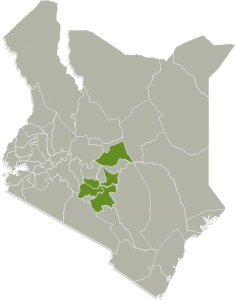| CATEGORY: | NGO |
| CSA PROJECT: | HALT Climate Change |
| SCALE: | County Coordination Actions |
| LOCATION: | Kiambu, Meru, Muranga, Embu, Machakos, Tharaka-Nithi |
| PERIOD OF THE PROJECT: | 2019-2021 |
| GRANT SIZE OF THE PROJECT: |
INSTITUTE FOR CULTURE AND ECOLOGY

SUMMARY OF ACTIONS
The Institute for Culture and Ecology is involved in community based environmental and resource management initiatives that enhance the social and ecological wellbeing. Key activities include: capacity development of farmers on agro-ecology farming and climate adaptation and mitigation practices, promoting establishment of non-timber enterprises, support for diversification of livelihoods, advocacy for enactment of policies at the County level related to CSA, nnetworking at county-level to promote agro-ecology and CSA practices, documentation and sharing of best CSA practices.
CONTEXT
Agriculture is the major source of livelihood among most rural communities in ICE target project areas. Poor ecosystem management and unpredictable weather due to climate change are disrupting agriculture production in many parts of Kenya. ICE accompanies rural communities farmers in awareness creation and capacity development. ICE also works with conservation groups through supporting community-led conservation initiatives, such as tree planting, to mitigate climate change.
OBJECTIVE
The objective of the project is to enhance the community capacity in ecosystem management and sustainable farming practices for improved food sovereignty and economic wellbeing. Specific objectives include to strengthen local institutions for collective community participation, and to mobilize multi-stakeholder platforms at the County-level for promotion of agro-ecology at policy and implementation levels.
KEY INTERVENTIONS
| FARM LEVEL | TARGET(NO OF FARMERS) | INDICATORS MONITORED |
| Soil management | 5000 | · Number and type of soil conservation technologies adopted.
· Number of farmers using compost manure |
| Agroforestry | 1500 | · Number of farmers trained on agroforestry,
· % of land with agroforestry trees, · Yields from production of fodder crops, agroforestry trees, herbs and shrubs, · Number of trees established |
| Promotion of drought tolerant crops | 2500 | · Number and type of drought tolerant crops,
· Number of indigenous and traditional seeds recuperated. |
| Livestock feed management | 1500 | · Number and type of fodder crops |
| Smart water management | 3000 | · Number and type of on-farm water harvesting structures constructed |
| Disease and pest management | 1800 | · Number of farmers using biological pest and disease management |
| Renewable energy | 1800 | · Number sensitized on renewable energy And
· Renewable energy structures installed |
| BEYOND FARM LEVEL | TARGET BENEFICIARIES | INDICATORS MONITORED |
| Gender (Youth and Women inclusion in CSA) | 6000 | · Number by gender and age of direct beneficiaries. |
| Policy and Advocacy | · Number of CSA policies influenced | |
| CSA based access to markets and value chains | 1500 | · Number of organized farmer market groups established and operational
· Market linkages established |
PARTICIPATION IN KEY CLIMATE &AGRICULTURE NETWORKS
ICE is a member of the following networks: Participatory Ecological and Land Use Management (PELUM) Association of Kenya, Biodiversity & Biosafety Association of Kenya (BIBA), African Biodiversity Network (ABN) and Compass Africa.
INVOLVEMENT IN CSA
RELEVANCE OF CSA MSP TO WORK
- Policy formulation
- Knowledge dissemination
- Technology transfer
- Information on CSA
- Networking
- Learning and exchange
- Reporting and showcasing
- Influencing policy environment
RECOMMENDATION ON WAYS TO SUPPORT MSP
- Developing specific CSA policies, legislations, strategies and, plans
- Dissemination of CSA technologies
- Capacity building for actors involved in CSA
- Mobilizing actors and facilitating dialogue on CSA issues/actions
LESSONS LEARNED AND CHALLENGES IN IMPLEMENTATION OF CSA PROJECT
Project achievements include: increased yields, linkages between farmers and service providers, and increased support by diverse actors in the target project areas. A challenge is lack of political will on policy development to support promotion of CSA in some counties.
RELEVANT LINKS & REFERENCES
ORGANISATION INFORMATION AND CONTACT ADRESS INCASE OF FOLLOW UP
Name: Martin M. Muriuki
Email address: martin@icekenya.org
Phone address: 0721565013
Organisational Physical address: Garden Estate Nairobi along Garden Estate Road
Organisational Website: https://www.icekenya.org/
